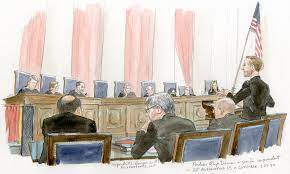The Supreme Court Restricts Access to Discovery in Foreign Arbitration Proceedings

The Volkov Law Group is pleased to publish this blog article co-authored by two of our summer interns, Benjamin Clachko, a rising sophomore at the University of Vermont, and Ali Kaplan, a rising sophomore at Lehigh University. Benji and Ali have been learning about civil litigation generally, and discovery in particular. This recent Supreme Court opinion caught their attention. We think it may be of interest to our blog readers as well.
Anyone involved in civil litigation in the United States knows that U.S. courts permit broad discovery, in contrast to many foreign tribunals with narrower discovery rules. What foreign litigants may not know is that, under federal law, foreign litigants engaged in litigation in foreign tribunals can take advantage of liberal U.S. discovery rules under 28 U.S.C. § 1782.
Under Section 1782, foreign litigants may apply to a federal district court in the U.S. for an order directing a person within the court’s jurisdiction to provide evidence for use in foreign proceedings. Generally, a district court will grant a Section 1782 discovery request if: (a) the foreign party seeking discovery has an interest in the foreign proceeding; (b) the discovery will be used in that foreign proceeding; and (c) the target of the discovery resides (or can be found) in the judicial district where the request is made. Not surprisingly, in our global economy, where many foreign companies have U.S.-based subsidiaries and/or agents, Section 1782 is frequently invoked in connection with international disputes.

In 2004, the U.S. Supreme Court decided that Section 1782 was not limited to foreign courts but also applied to quasi-judicial or administrative agencies, including the Directorate-General for Competition of the European Commission, which was at issue in that case. See Intel Corp v Advanced Micro Devices. But the question remained whether Section 1782 could be used to obtain discovery for use in private arbitration abroad. On June 13, 2022, the Supreme Court decided ZF Automotive US, Inc v. Luxshare, Ltd. which provides further guidance on the type pf adjudicative body that qualifies as a “foreign or international tribunal” under Section 1782. In this recent case, the Supreme Court resolved a Circuit split and held that a “foreign or international tribunal” applies exclusively to a governmental or intergovernmental adjudicative body, not to private adjudicative bodies.
The language of 28 U.S.C. § 1782 was a primary topic of focus in this SCOTUS case. The decision centered around the Supreme Court’s interpretation of the phrase “foreign or international tribunal.” In a unanimous decision, the Court confirmed that Section 1782 is best understood to describe bodies that exercise governmental authority, not private adjudicative bodies that happen to be “foreign,” i.e., located abroad. In so holding, SCOTUS determined that the adjudicative bodies in the two consolidated cases before it were not “foreign or international tribunals” within the meaning of Section 1782.

Here’s a breakdown of the two consolidated cases. The title case involved an attempt by Luxshare Ltd., a Hong Kong-based company, to obtain discovery from ZF Automotive US, a Michigan subsidiary of a German company. Both parties originally agreed through a sales contract that all disputes would be handled by three arbitrators under the Arbitration Rules of the German Institution of Arbitration, or a Berlin-based private dispute-resolution organization (“DIS”). In preparation for the DIS arbitration against ZF Automotive, Luxshare sought discovery in the United States under Section 1782 to gather information, which they hoped would help to prove that ZF fraudulently concealed material facts in their deal. ZF Automotive argued that the DIS panel could not be considered a “foreign or international tribunal.” The United States District Court for the Eastern District of Michigan disagreed, holding the private arbitration panel should be considered a “foreign tribunal.” Thus, the District Court ordered ZF Automotive to produce documents and have its officer sit for a deposition. The Sixth Circuit denied ZF’s request for a stay.
The second case before the Court was AlixPartners, LLC vs. Fund For Protection of Investor Rights in Foreign States. In that case, a Russian-based corporation assigned the rights of a Russian investor in a failed Lithuanian bank (declared insolvent and nationalized by Lithuanian authorities) sought discovery in New York for use in a proceeding against Lithuania under a bilateral investment treaty between Lithuania and Russia. The treaty established optional dispute resolution procedures, and the Russian fund chose an ad hoc arbitration in accordance with Arbitration Rules of the United Nations Commission on International Trade Law. After initiating arbitration, the Russian fund sought discovery from a temporary administrator of the failed bank and his New York-based consulting firm. The consulting firm opposed discovery, arguing that the ad hoc arbitration panel was not a “foreign or international tribunal” under Section 1782. The District Court rejected that argument and granted the Russian fund’s discovery request. The Second Circuit affirmed.

The Supreme Court granted certiorari on December 10, 2021 and conducted oral argument on March 23, 2022.
During the March oral argument, Attorney Roman Martinez argued that the word “foreign” as it is used in the courts strongly implies governmental context. In his argument, he used the phrase “foreign leader” as an example, reasoning that although the captain of the Manchester United Soccer team is both foreign and a leader, statutes applicable to foreign leaders would not apply to him, as he is not a foreign leader in a judicial sense.
Though the word “tribunal” is not synonymous with “court,” by nature, SCOTUS reasoned, when attached to modifier such as “foreign or international” its meaning refers to a body that is capable of exercising governmental authority and belongs to a foreign nation as opposed to simply being located within one.
With regard to ZF Automotive v. Luxshare, SCOTUS found that “[p]rivate parties agreed in a private contract that DIS, a private dispute resolution organization, would arbitrate any disputes between them.” Because DIS is not governmental, and “no government body took part in its creation,” DIS should not be considered a “foreign tribunal” within the meaning of Section 1782. That case, SCOTUS held, was relatively “straightforward.”
In the more difficult, second case, SCOTUS held that an “ad hoc arbitration panel” formed for the purpose of adjudicating investor-state disputes was also a private tribunal because it “functions independently” of and is not affiliated with any foreign governmental or intergovernmental entity. Like a private arbitration panel, it “derives its authority from the parties’ consent to arbitrate,” despite its inclusion in a treaty (“The relevant question is whether the nations intended that the ad hoc panel exercise governmental authority.”) Accordingly, Section 1782 would not permit discovery in the U.S. for use in that adjudicative body either.
From now on, U.S. District Courts will no longer be able to compel discovery under Section 1782 for use in private arbitrations abroad, and litigants will need to explore alternative means of obtaining information needed to prove their claims.















1 Response
[…] Source link […]